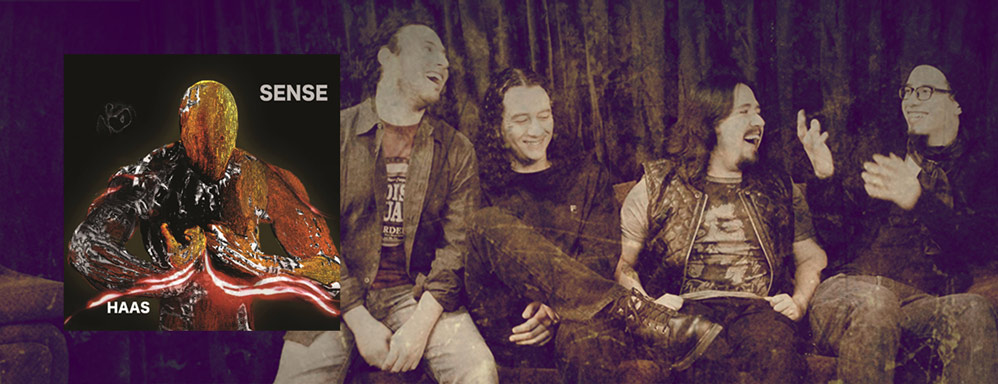Album
H.A.A.S: 'Sense'
(Self-released, 2014)

If there is something that defines rock music it is the attempt by some critics and observers to categorize their practitioners in a simple sucession of genres and movements.
However, listening to some albums published ths last year suffices to realize their assumptions as erroneous: practically all historical genres, with their boundaries more and more blurred, keep on receiving the attention of new artists. One of the most critically maligned genres is, perhaps, progressive rock, the genre of the album we will now review.
Hailing from Bogotá, the Hass brothers attempt to show an increasingly skeptical world that it is still possible to believe in a music overflowing with signifiers and meanings, in repetition and transformation of classical stereotypes, in trip and transit as models of sonic adventure.
A compromise between the inevitability of metal and nowadays prog
Their debut album adheres to the criteria of generic distinction that the "progressive" label has acquired over the last thirty years: above all, the structural changes in songs that are perhaps too short to develop their grand, ambitious themes with full efficacy. For an example, 'Digimential' could be just “another rock song” but it is the introduction of technical motives and elements what evetually marks the difference. Among them, a certain instrumental expertise, noticeable in the guitar solos, makes the song appear as a compromise between the inevitability of metal and the supremacy that Steven Wilson and their Porcupine Tree have in the prog genre nowadays.
This influences are clear across the album, but it is in the more agressive songs (like this 'Digimental' or 'Beggining') where they seem to be their main inspiration when composing.
The second track, ('The Voyage of Captain Nirvana'), The Voyage of Captain Nirvana, appears as the main attraction of the album. In it, the band develops some interesting classical sonorities, full with orchestral arrangements and a borderline gothic singing voice. Thus, the song bounces between the postmodern grandeur of Van der Graaf Generator and the gothic pomp of the transitional Anathema.
In some moments, the focus shifts towards the arrangements, in a way that brings to mind the lush abyssal forest drawn by Therion in their albums. However, the band doesn't manage for this song to resolve the two fights that make up the fundamental problematique of the album: the aesthetic one, between the solemn and the cosmic, and the ideological, between imitation and trasngression. Such clashes manage to cast shadows upon several passages that, with a less tense realisation (and less restricted by the confines of the genre) could turn into an act all the light that the brothers' instrumental skill reveals as potential.
Threads into the world of electronic music and the result works
In the last instants of this very song, when the eponymous Captain Nirvana finally takes his travel to the confines of the knowable world, thus directing our stare to a horizon of a thousand trascendences, when we can fully appreciate the universe of unfulfilled possibilities that lies within H.A.S.S music.
With Rythm and Doom, the band shows that their knoweledge is not limited to metal and prog, but threads into the world of repetitive electronic music and its usage within a rock context. While I am not a big supporter of progressive forays into such territory, I must confess that the results works quite smoothly. In this track, H.A.S.S shows themselves fully capable of performing within the tension between different genres that one may consider almost opposed without falling clearly towards the simple imitation of one of them (like Pure Reason Revolution did before their ultimate disintegration). As we will see, this detail makes the unresolved dialectical tensions that the band does not manage to resolve even deeper.
Fusion also has its place in 'Crazy, Sadly, Nasty', another little suite whose ornaments are “neoclassical” in the most literal of senses, sticking to a certain compositional restraint that makes the song less extravagant, both in execution and mixxing, than the preceding ones.
'Living Dead', despite keeping close to prog metal clichés, has a character that is vehement enough to earn by force the listeners' attention.
For my liking, 'The Box' the last song of the album if we ignore the extras, violates the frontier between emotional and sugary, taking us by hand to lead us towards the most gothic realms of the prog world.
They leave this debut, interesting seed of what's to come
What we have, in summary, is an album that does not fear to push the boundaries imposed by the aesthetic superficiality of our time, opposing pasivity with activity, contemplation with travel and depression with cry. But despite commiting such valiant sins, H.A.S.S Sense does not manage to bring any element of originality to the progressive discourse... but it is not their fault.
As I pointed out at the beggining of the review, tags and genres make us forget the origin and intentionality of artistic movements. “Progressive” means, basically, desiring to change the establishment, and such a meaning will always be conflicted with the ascription to some tag, an act that forces the artist to imitate models and restrict possible stylistic facets. Those that in the last decades adhered themselves to the “prog rock” tag made us forget the true meaning behind “progressive”, which is not merely aesthetic but ideological.
In H.A.S.S, we find all the talent needed to go one step beyond, to make an album to destroy the discourse on music genres, to show that the artist (and not such discourse) is in real control of the meaning and orientation of its work. Their knoweledge of the diversity and interconnection inherent to the world of pop music and their skill as musicians will surely make them perform an album sure to help destroying that wall, that critics' disease that are the musical genres. Until then they leave this debut, interesting seed of what's to come that doesn't dare yet.
Text: Dimas F. Otero
There's more in https://haas1.bandcamp.com/releases



